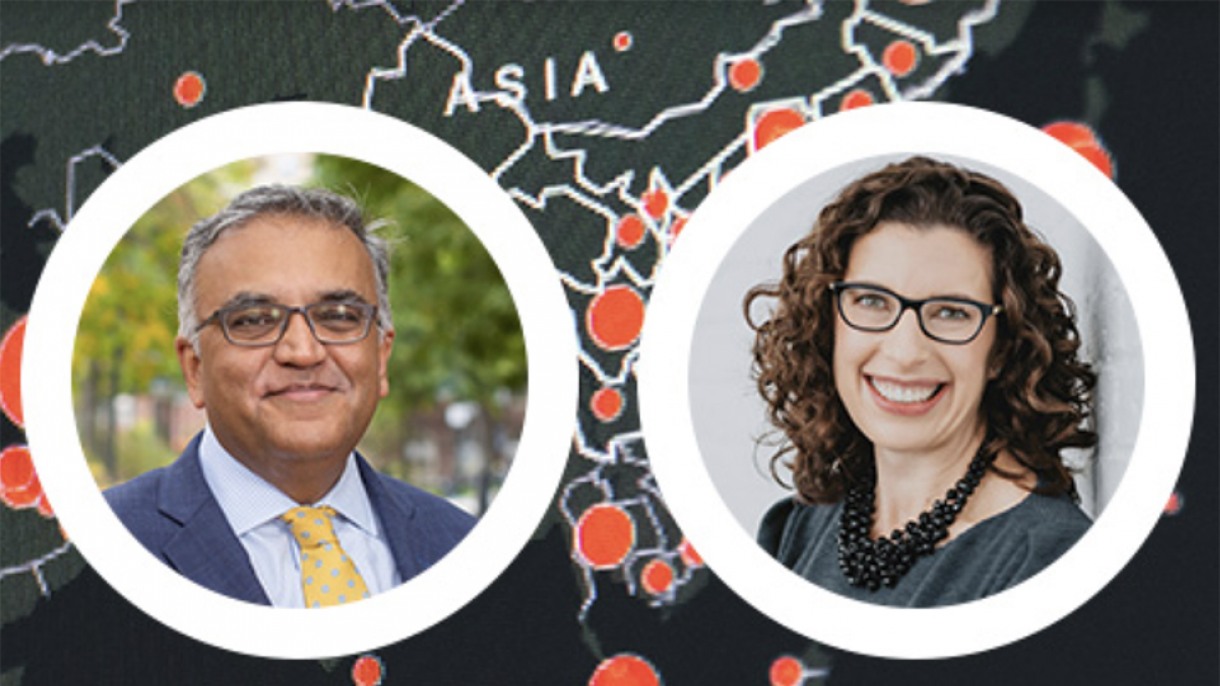
“In that session, participants learned about using agile thinking to meet a tremendous local need,” Ranney said. “I hope that what they took from that was that you don’t need to sit helplessly and bemoan a problem — in times of crisis, you can think creatively and also form coalitions to create change.”
The class roster of 46 included leaders in government, business, community organizations, health, education, law and more. Staff at the School of Public Health actively recruited participants who support marginalized communities, many of whom were awarded course scholarships.
A March 11 class session featured Dr. Uché Blackstock, founder and CEO of Advancing Health Equity and an emergency physician. In a lively conversation about health inequalities, Ranney and Blackstock discussed how Black people have higher risk factors for health issues that have nothing to do with biology, and how skin color often serves as a marker of “social determinants” that impact health and wellness. Blackstock stressed the importance of addressing health inequities with policies that build the strength of communities.
As they spoke, the chat thread for the virtual course was abuzz with a tandem discussion of useful synonyms for “social determinants” — “social risk factors,” “social predictors of health,” “adverse childhood experiences,” “adverse community environments” were all unpacked and evaluated.
Attendees had a number of questions for Blackstock. One person asked: “How do we create change even if we’re not at the top of the ladder at our organization?” Many participants were curious about Blackstock’s experience with opinion writing as a form of activism. Last year, she wrote a widely shared op-ed in which she called upon academic medical centers, including the one she had recently left, to “recognize and rectify the historical and current impact of racism on the health care workforce.” Blackstock encouraged members of the class to consider channeling their own critiques and experiences into op-eds, and provided practical tips she used to get started.
Course participant Dr. Mark Sendak took that advice to heart. Sendak, a clinical data scientist at the Duke Institute for Health Innovation, co-authored an op-ed about the need to compensate community organizations for their efforts to ensure vaccination equity. The piece was published two weeks after the class on the political news website The Hill. In a tweet about the op-ed, Sendak credited Blackstock, Ranney and Jha as his inspiration.
Creating a community of practice
Alison Wilcox, CEO of the Girl Scouts of Western New York, found the Brown course while searching for crisis management training that would allow her to synthesize her work over the past year not only as a CEO, but as a member of the parent organization’s national COVID-19 task force. The session that made the greatest impact involved applying harm reduction principles to business operations during the pandemic, she said.
“It helped me think about how the Girl Scouts organization can meet the needs of our members, in terms of offering in-person meet-ups, while also being as safe as possible,” Wilcox said. “As we plan for summer and think about camp, we’re really deeply thinking through risk-mitigation strategies.”
Another important lesson, she added: “Being a strong business doesn’t simply mean that you’re able to go back to normal after a crisis. It also really matters how your organization helps its people recover from the trauma we’ve all been through. That was something that really stood out to me.”
Wilcox said she appreciated how the course structure of guest presentations, breakout discussions and supplemental work outside of class strengthened the learning experience.
“This past week at our national committee meeting, I was sharing some of my takeaways,” Wilcox said. “The course really lifted me up. I feel calmer and better able to lead us through the next — and hopefully last — phase of the pandemic.”
Ranney said that while the course provided relevant information and helped participants develop critical thinking skills about acute public health pandemics, the most important thing it accomplished was to create a community of practice: “These are leaders who have been trying to figure out these big challenges on their own,” she said. “We provided them with the connections that they may have been lacking in the pandemic.”
For course participant Mary Harrison, interim health director of the Choctaw Health Center in Mississippi, the opportunity to share with and learn from other leaders was invaluable.
“In our breakout rooms, we were able to have the kind of open conversations about the challenges of the pandemic that we might not feel comfortable having with others in our organizations,” Harrison said. “I feel optimistic that our community and our bond will exist beyond this course.”
Jha and Prasad noted that while faculty across campus have implemented a wide range of innovative approaches to remote and hybrid courses during the COVID-19 pandemic, the course offered a new model for bringing Brown’s world-class education to new communities of learners in a short-duration format — a model that University academic leaders plan to build on in the future.
“With the Pandemic Problem-Solving course, we were trying to meet the moment and address a real educational need with a flexible, high-quality educational model,” Jha said. “It went incredibly well, and I feel like this could be the beginning of something really powerful and long-lasting.”
"course" - Google News
April 07, 2021 at 01:59AM
https://ift.tt/3dITGbY
Innovative virtual course helps leaders tackle pandemic challenges in real time - Brown University
"course" - Google News
https://ift.tt/35q9ps5
https://ift.tt/35rCFi1
Bagikan Berita Ini














0 Response to "Innovative virtual course helps leaders tackle pandemic challenges in real time - Brown University"
Post a Comment